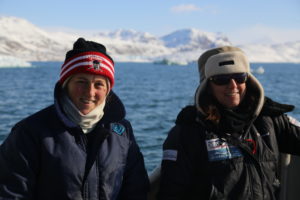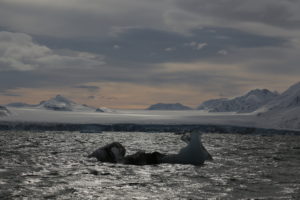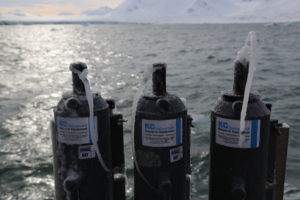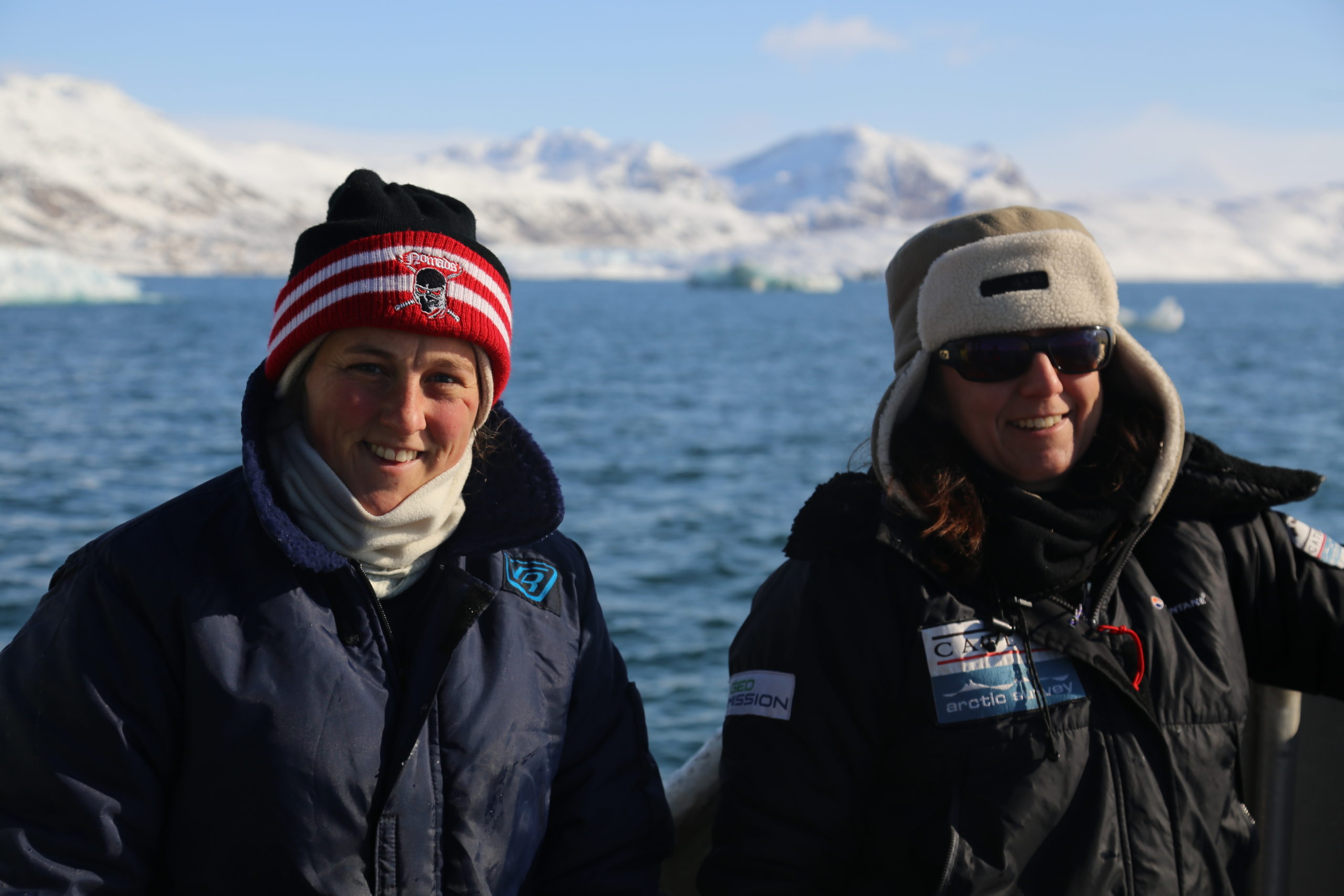 Words by Clara Nielson, University of Exeter PhD Student
Words by Clara Nielson, University of Exeter PhD Student
A day in the life of an Arctic field scientist
Hello! My name is Clara Nielson and I am a PhD student from Exeter University studying the impacts of global change on marine species in Dr Ceri Lewis’s lab. We are currently at 78 degrees north in a place called Ny Alesund, in Svalbard at the UK NERC Arctic Station for AXA XL Arctic Live with Encounter Edu. We are here to both conduct important research but also to communicate what we are doing to schools around the world.
Clara Nielson and Dr Ceri Lewis in the Arctic
Pulling open the curtains to a view of snow covered mountains and glaciers on the edge of a fjord will guarantee to put a smile on your face and put you in a good mood for the rest of the day. Our usual day starts waking up in the base and heading to the canteen for breakfast. Ny Alesund is home to a range of international scientists all coming and going at different parts of the year and the canteen is the communal hub where everyone can share a meal, and a story or two, before heading off for the day.
Arctic View
Weather permitting (we have had a few base days where we are unable to get out onto the boat due to high winds) we usually spend the day out on Teisten, the research boat, collecting water samples from different parts and depths of the fjord. We are out here to monitor the pH and carbonate chemistry of the seawater, as part of a global ocean acidification project. Ocean acidification is the change in ocean chemistry as a result of increasing atmospheric carbon dioxide levels and this process is happening fastest in the Arctic. The samples we are taking will help fill in the global picture of just how fast this process is happening. We are also sampling for any microplastics that may be in the seawater as the Arctic is also thought to be a hotspot for microplastic accumulation due to ocean currents. We were here last year doing the same sampling, and we did find some plastic, so it will be really interesting to compare our data and that of other long term projects to see how the Arctic is changing. Today it was -7oC, which is pretty cold but add to that the wind chill and we were out in temperatures of about -25 oC. This made sampling slightly trickier than at home as the seawater and all of our sampling gear was freezing pretty quickly, not to mention how cold my hands were getting! Its hard to describe how that sort of temperature feels but basically it’s painfully cold. Thankfully team work, biscuits and a kettle kept everything working!

The cold is soon forgotten as once the days sampling is over we can head back to our heated base but the hot shower has to wait just a little longer! First, we need to make sure all our kit is cleaned ready to go again tomorrow and the samples are stored away correctly.
After dinner we spend a bit of time looking through samples and manage to show our Arctic base manager Nick his first sea angel! This is a type of zooplankton called a pteropod, which flapped around our petridish and made this seasoned field man swoon at its beauty.
Frozen equipment is a daily challenge.
Before bed I spend a bit of time with Jamie, from Encountered Edu, going through what I shall be doing tomorrow as it is my day to take part in Arctic Live. Arctic Live is the other important reason we are all here, as alongside our research we are taking part in a live streaming educational lessons and question and answer sessions where we speak to school children live from around the world about our experiences and answer their questions about the Arctic and what it is like to work here. I am looking forward to hearing what questions the children have come up with! Its really cool that we can share what we are doing live from this amazing place, I hope it inspires them.
It is time for bed once we are all set for tomorrow, the 24-hour daylight is making it slightly harder to get to sleep as you feel like it should be the middle of the afternoon, not 11pm but it is important that we all get a good rest.
I feel very privileged to be out in such a stunningly beautiful place and it is without doubt the best place I have ever done field work in. The wildlife here is amazing too, today we saw a Minke whale from the end of the boat which was incredible. The Arctic is at the forefront of climate change where the impacts are being felt first and fastest and is also a hotspot for plastic pollution so it is probably the most important place to be doing this kind of science right now.
All images a courtesy of Jamie Buchanan-Dunlop of Encounter Edu.
#ExeterMarine is an interdisciplinary group of marine related researchers with capabilities across the scientific, biological, medical, engineering, humanities and social science fields.
Find us on: Facebook : Twitter : Instagram : LinkedIn
If you are interested in working with our researchers or students, contact Michael Hanley or visit our website!

